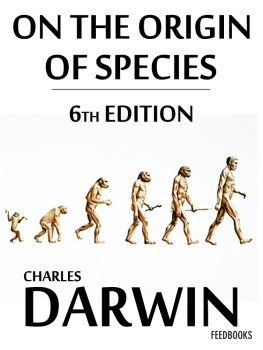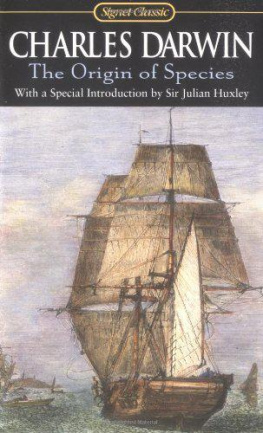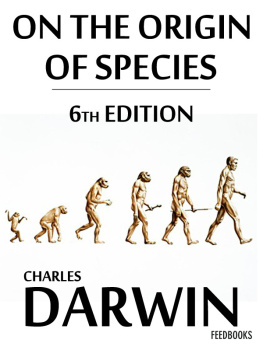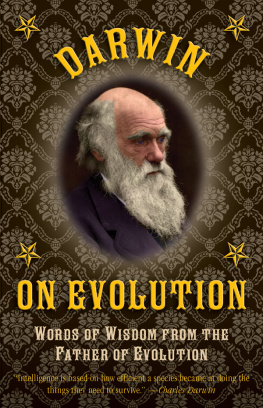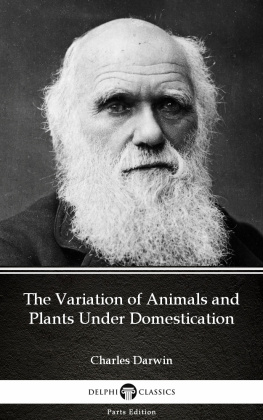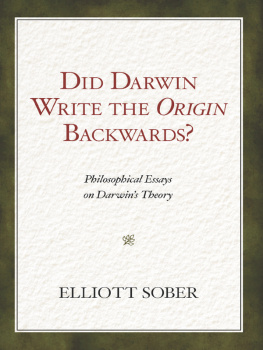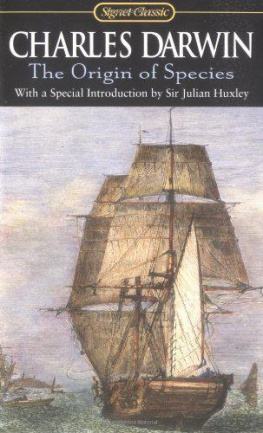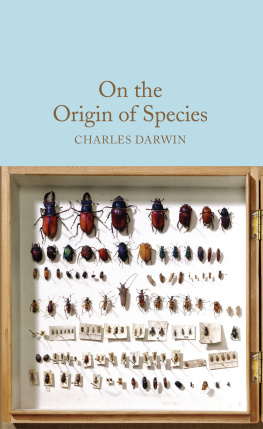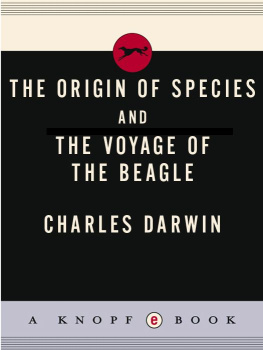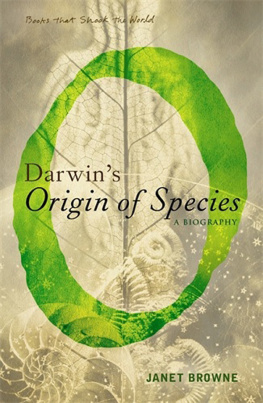Charles Darwin - On the Origin of Species
Here you can read online Charles Darwin - On the Origin of Species full text of the book (entire story) in english for free. Download pdf and epub, get meaning, cover and reviews about this ebook. year: 1872, publisher: Feedbooks, genre: Science. Description of the work, (preface) as well as reviews are available. Best literature library LitArk.com created for fans of good reading and offers a wide selection of genres:
Romance novel
Science fiction
Adventure
Detective
Science
History
Home and family
Prose
Art
Politics
Computer
Non-fiction
Religion
Business
Children
Humor
Choose a favorite category and find really read worthwhile books. Enjoy immersion in the world of imagination, feel the emotions of the characters or learn something new for yourself, make an fascinating discovery.
- Book:On the Origin of Species
- Author:
- Publisher:Feedbooks
- Genre:
- Year:1872
- Rating:4 / 5
- Favourites:Add to favourites
- Your mark:
- 80
- 1
- 2
- 3
- 4
- 5
On the Origin of Species: summary, description and annotation
We offer to read an annotation, description, summary or preface (depends on what the author of the book "On the Origin of Species" wrote himself). If you haven't found the necessary information about the book — write in the comments, we will try to find it.
On the Origin of Species — read online for free the complete book (whole text) full work
Below is the text of the book, divided by pages. System saving the place of the last page read, allows you to conveniently read the book "On the Origin of Species" online for free, without having to search again every time where you left off. Put a bookmark, and you can go to the page where you finished reading at any time.
Font size:
Interval:
Bookmark:


Published: 1872
Categorie(s): Non-Fiction, Science and Technics,Science
Source: Feedbooks
http://www.feedbooks.com
Strictly for personal use, do not use this file for commercialpurposes.
"But with regard to the material world, we can at least go sofar as this we can perceive that events are brought about not byinsulated interpositions of Divine power, exerted in eachparticular case, but by the establishment of generallaws."Whewell: "Bridgewater Treatise".
"The only distinct meaning of the word 'natural' is STATED,FIXED or SETTLED; since what is natural as much requires andpresupposes an intelligent agent to render it so, i.e., to effectit continually or at stated times, as what is supernatural ormiraculous does to effect it for once."Butler: "Analogy ofRevealed Religion".
"To conclude, therefore, let no man out of a weak conceit ofsobriety, or an ill-applied moderation, think or maintain, that aman can search too far or be too well studied in the book of God'sword, or in the book of God's works; divinity or philosophy; butrather let men endeavour an endless progress or proficience inboth."Bacon: "Advancement of Learning".
I will here give a brief sketch of the progress of opinion onthe Origin of Species. Until recently the great majority ofnaturalists believed that species were immutable productions, andhad been separately created. This view has been ably maintained bymany authors. Some few naturalists, on the other hand, havebelieved that species undergo modification, and that the existingforms of life are the descendants by true generation of preexisting forms. Passing over allusions to the subject in theclassical writers (Aristotle, in his "Physicae Auscultationes"(lib.2, cap.8, s.2), after remarking that rain does not fall inorder to make the corn grow, any more than it falls to spoil thefarmer's corn when threshed out of doors, applies the same argumentto organisation; and adds (as translated by Mr. Clair Grece, whofirst pointed out the passage to me), "So what hinders thedifferent parts (of the body) from having this merely accidentalrelation in nature? as the teeth, for example, grow by necessity,the front ones sharp, adapted for dividing, and the grinders flat,and serviceable for masticating the food; since they were not madefor the sake of this, but it was the result of accident. And inlike manner as to other parts in which there appears to exist anadaptation to an end. Wheresoever, therefore, all things together(that is all the parts of one whole) happened like as if they weremade for the sake of something, these were preserved, having beenappropriately constituted by an internal spontaneity; andwhatsoever things were not thus constituted, perished and stillperish." We here see the principle of natural selection shadowedforth, but how little Aristotle fully comprehended the principle,is shown by his remarks on the formation of the teeth.), the firstauthor who in modern times has treated it in a scientific spiritwas Buffon. But as his opinions fluctuated greatly at differentperiods, and as he does not enter on the causes or means of thetransformation of species, I need not here enter on details.
Lamarck was the first man whose conclusions on the subjectexcited much attention. This justly celebrated naturalist firstpublished his views in 1801; he much enlarged them in 1809 in his"Philosophie Zoologique", and subsequently, 1815, in theIntroduction to his "Hist. Nat. des Animaux sans Vertebres". Inthese works he up holds the doctrine that all species, includingman, are descended from other species. He first did the eminentservice of arousing attention to the probability of all change inthe organic, as well as in the inorganic world, being the result oflaw, and not of miraculous interposition. Lamarck seems to havebeen chiefly led to his conclusion on the gradual change ofspecies, by the difficulty of distinguishing species and varieties,by the almost perfect gradation of forms in certain groups, and bythe analogy of domestic productions. With respect to the means ofmodification, he attributed something to the direct action of thephysical conditions of life, something to the crossing of alreadyexisting forms, and much to use and disuse, that is, to the effectsof habit. To this latter agency he seems to attribute all thebeautiful adaptations in nature; such as the long neck of thegiraffe for browsing on the branches of trees. But he likewisebelieved in a law of progressive development, and as all the formsof life thus tend to progress, in order to account for theexistence at the present day of simple productions, he maintainsthat such forms are now spontaneously generated. (I have taken thedate of the first publication of Lamarck from Isidore GeoffroySaint- Hilaire's ("Hist. Nat. Generale", tom. ii. page 405, 1859)excellent history of opinion on this subject. In this work a fullaccount is given of Buffon's conclusions on the same subject. It iscurious how largely my grandfather, Dr. Erasmus Darwin, anticipatedthe views and erroneous grounds of opinion of Lamarck in his"Zoonomia" (vol. i. pages 500-510), published in 1794. According toIsid. Geoffroy there is no doubt that Goethe was an extremepartisan of similar views, as shown in the introduction to a workwritten in 1794 and 1795, but not published till long afterward; hehas pointedly remarked ("Goethe als Naturforscher", von Dr. KarlMeding, s. 34) that the future question for naturalists will behow, for instance, cattle got their horns and not for what they areused. It is rather a singular instance of the manner in whichsimilar views arise at about the same time, that Goethe in Germany,Dr. Darwin in England, and Geoffroy Saint-Hilaire (as we shallimmediately see) in France, came to the same conclusion on theorigin of species, in the years 1794-5.)
Geoffroy Saint-Hilaire, as is stated in his "Life", written byhis son, suspected, as early as 1795, that what we call species arevarious degenerations of the same type. It was not until 1828 thathe published his conviction that the same forms have not beenperpetuated since the origin of all things. Geoffroy seems to haverelied chiefly on the conditions of life, or the "monde ambiant" asthe cause of change. He was cautious in drawing conclusions, anddid not believe that existing species are now undergoingmodification; and, as his son adds, "C'est donc un probleme areserver entierement a l'avenir, suppose meme que l'avenir doiveavoir prise sur lui."
In 1813 Dr. W.C. Wells read before the Royal Society "An Accountof a White Female, part of whose skin resembles that of a Negro";but his paper was not published until his famous "Two Essays uponDew and Single Vision" appeared in 1818. In this paper hedistinctly recognises the principle of natural selection, and thisis the first recognition which has been indicated; but he appliesit only to the races of man, and to certain characters alone. Afterremarking that negroes and mulattoes enjoy an immunity from certaintropical diseases, he observes, firstly, that all animals tend tovary in some degree, and, secondly, that agriculturists improvetheir domesticated animals by selection; and then, he adds, butwhat is done in this latter case "by art, seems to be done withequal efficacy, though more slowly, by nature, in the formation ofvarieties of mankind, fitted for the country which they inhabit. Ofthe accidental varieties of man, which would occur among the firstfew and scattered inhabitants of the middle regions of Africa, someone would be better fitted than others to bear the diseases of thecountry. This race would consequently multiply, while the otherswould decrease; not only from their in ability to sustain theattacks of disease, but from their incapacity of contending withtheir more vigorous neighbours. The colour of this vigorous race Itake for granted, from what has been already said, would be dark.But the same disposition to form varieties still existing, a darkerand a darker race would in the course of time occur: and as thedarkest would be the best fitted for the climate, this would atlength become the most prevalent, if not the only race, in theparticular country in which it had originated." He then extendsthese same views to the white inhabitants of colder climates. I amindebted to Mr. Rowley, of the United States, for having called myattention, through Mr. Brace, to the above passage of Dr. Wells'work.
Font size:
Interval:
Bookmark:
Similar books «On the Origin of Species»
Look at similar books to On the Origin of Species. We have selected literature similar in name and meaning in the hope of providing readers with more options to find new, interesting, not yet read works.
Discussion, reviews of the book On the Origin of Species and just readers' own opinions. Leave your comments, write what you think about the work, its meaning or the main characters. Specify what exactly you liked and what you didn't like, and why you think so.

